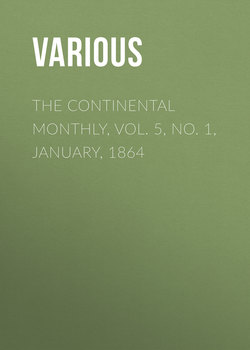Читать книгу The Continental Monthly, Vol. 5, No. 1, January, 1864 - Various - Страница 10
RETROSPECTIVE
LEGISLATION—THE CONFISCATION LAW
ОглавлениеThe action of Congress has in everything been nobly patriotic in spirit, and in nearly everything it has wisely and adequately met the exigencies of the crisis.
But we are compelled to hold the Confiscation Act, in the form in which it was passed, as a mistake.2 If the clause of the Constitution prohibiting 'attainder of treason to work forfeiture except during the life of the person attainted,' be necessarily applicable to the Confiscation Act, it seems to us impossible to avoid the conclusion that the act is unconstitutional. So far as the language of the prohibition is decisive of anything, it must be taken to include all sorts of property, real as well as personal—the term forfeiture certainly having that extent of application in the old English law and practice, from which the framers of our Constitution took it, and there is nothing elsewhere in the Constitution or in its history to warrant any other construction. So the Congress of 1790 understood it in the act declaring the punishment of treason and some other high crimes. As to the perpetuity of forfeiture, it seems equally necessary to hold that it is prohibited by the clause of the Constitution in question. Such is undeniably the first and obvious meaning of the terms. It has been argued indeed that it was not the intention of the framers of the Constitution to prohibit perpetual forfeiture of property from being 'declared' by Congress, but only to prohibit 'attainder of treason' from 'working' of itself that effect by necessary consequence—as it did under the Common Law of England. It has also been argued that the constitutional restriction does not relate to perpetuity of forfeiture, but only requires that the forfeiture or act of alienation take place, have effect, and be accomplished 'during the life of the person attainted,' and not after his death.
But this reasoning is more subtile than satisfactory. A fair consideration of the subject leaves little room for doubt that the framers of the Constitution had in view and intended to prohibit everything which under the old English common law followed upon 'attainder of treason'—to prohibit forfeiture in perpetuity of property of every sort, no less than 'bills of attainder,' 'corruption of blood,' and barbarities of punishment, such as disembowelling, quartering, etc.
If therefore the constitutional restriction on forfeiture apply to the Confiscation Law, it makes the law unconstitutional, in so far as it enacts the perpetual forfeiture of the personal estate of rebels; and the discrimination made in regard to their real estate does not save the constitutionality of the act.
If, therefore, the Confiscation Law is to be held as constitutional, it can be so, as it seems to us, only on the ground that it does not fall within the scope of the constitutional prohibition in question. This ground may be maintained by asserting that the constitutional prohibition of perpetual forfeiture applies only to cases of 'attainder of treason,' that is, according to Blackstone, of 'judgment of death for treason,' and that cases under this act are not such; that the limitations applicable to ordinary judicial proceedings against traitors are not applicable here; that the Confiscation Act seizes the property of rebels not in their quality of criminals, but of public enemies; that it is not an act for the punishment of treason, but for weakening and subduing an armed rebellion, and securing indemnification for the costs and damages it has entailed—in short, not a penal statute, but a war measure; and that the Constitution which gives Congress the right to make war for the suppression of the rebellion, and to subject the lives of rebels to the laws of war, gives it the right to subject their property also to the same laws—putting both out of the protection of the ordinary laws; and finally that all the objects aimed at by the measure are legitimated by the principles of public law.
If these views can be sustained, it follows that Congress was justified not only in enacting the perpetual confiscation of the personal property of rebels, but need not, and should not, have passed the explanatory clause prohibiting 'forfeiture of real estate beyond the natural life' of the rebel. So far as weakening the rebellion, indemnifying the nation for costs and damages, or the rights and interests of the heirs of rebels, are concerned, there is no reason in justice or in policy for the discrimination made between personal and real estate; if it is right and wise to take the one in perpetuity, it is equally so to take the other. In our judgment, it is right and wise to do both.
2
In the 'Letters to Professor Morse,' in the November number of The Continental, a sentence on page 521, relating to the Confiscation Law, was left incomplete. The whole sentence should have been as follows: 'As to the Confiscation Acts—it is enough to say that the Constitution gives Congress power 'to declare the punishment of treason';—or if the constitutionality of the Confiscation law cannot be concluded from the terms of that grant—about which there may be a doubt—it is undoubtedly contained in the war powers vested in Congress.'
I have here put in italics the clause omitted in that article, and hope my readers will insert it in the proper place. The sentence, as thus completed, contains all I cared then to say on the point—my object being mainly to vindicate the justice and conformity to public law of the policy of confiscation. In the present article I have gone more at length into the question of the constitutionality of the law of Congress, and have come to the conclusions herein expressed.
